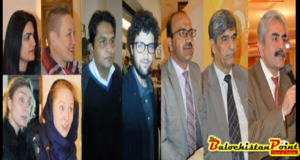On the same day, 28 people were killed and 65 wounded in a suicide bombing near an imambargah (mosque) in Quetta, 17 people were killed and 46 wounded in a car bomb attack on a Frontier Corps (FC) convoy in Badaber in the outskirts of Peshawar, and eight people were killed and 12 wounded in bomb attacks in South Waziristan. If the count of those killed and wounded is totted up, the day could rightly be termed Bloody Sunday. The suicide bombing attack in Quetta was aimed at the imambargah in congested Hazara Town, where massive bombings killed more than 200 people earlier this year. Prayers had just finished in the imambargah, and had the suicide bomber succeeded in reaching it, the toll would almost certainly have been higher. Fortunately (if one can use that word for an incident that nevertheless killed and injured so many), the attacker was stopped at a checkpoint set up by local volunteers and blew himself up some 50 yards from the imambargah. It is inexplicable why, when the area in question and the Hazara community in particular had been the target of horrendous bombings a few months ago, the security forces were not manning checkpoints instead of local community volunteers (many of whom must be amongst the dead and wounded as a result). This ‘lapse’ is likely to resurrect the Baloch nationalists’ contention that the security forces are concentrating on Baloch dissidents, attempting to quell the trouble through their ‘kill and dump’ policy, while turning a ‘blind eye’ to the activities of terrorists such as the Lashkar-e-Jhangvi (LeJ), which took responsibility for the attacks earlier this year. If the security forces wish to avoid such odious accusations, they should ensure the LeJ and other terrorist outfits in Balochistan are taken out and the kill and dump policy is at least put on hold if not abandoned to give peace a chance in the troubled province. In the Badaber bombing, although the target was a FC convoy, most of the victims were innocent people since the car bomb was parked in a busy market and detonated by remote control. Security forces sources said this attack may have been a response to the security sweeps carried out in the area in recent days. In two separate attacks, four members of a peace committee and four soldiers were killed and at least 12 people injured in the Wana/Miramshah area of South Waziristan.
This toll of human lives in one day in the troubled western borderlands adjoining Afghanistan serves to focus minds on the impending withdrawal of foreign troops and the efforts to get some sort of political settlement in Afghanistan before that withdrawal. Visiting British Prime Minister (PM) David Cameron in a joint press conference with PM Nawaz Sharif in Islamabad on Sunday put what he thought was needed unequivocally: “…a tough and uncompromising security response…” to terrorism. He added that such a response must be accompanied by investment in education and tackling poverty. Cameron went on to describe the situation because of terrorism as a common threat and huge global challenge. As part of the strategic dialogue with Pakistan, the British PM has promised help in providing technical support for the new counter-terrorism policy being contemplated by Nawaz Sharif’s government along with equipment to deal with improvised explosive devices, the weapon of choice of the terrorists. He has also extended help to Pakistan in ensuring the security of infrastructure and sharing expertise on safeguarding sporting events. Nawaz Sharif on the other hand, while condemning the bombing attacks, expressed his government’s resolve to conduct the struggle against terrorism until it was overcome. He also reiterated his government’s commitment to a peace deal in Afghanistan, a precarious process that was almost stillborn after the Taliban opened their office in Doha. Peace in Afghanistan, as both PMs reiterated, is crucial for Pakistan, which has lost over 40,000 people killed since 2004, 2,500 of them in this year alone (signifying an intensification of the terrorists’ campaign), and suffered estimated losses of $ 60 billion to the economy. The new counter-terrorism policy of the PML-N government is anxiously awaited, not the least because of the happenings on Bloody Sunday. (Courtesy :Daily Times)
 Balochistan Point Voice of Nation
Balochistan Point Voice of Nation




